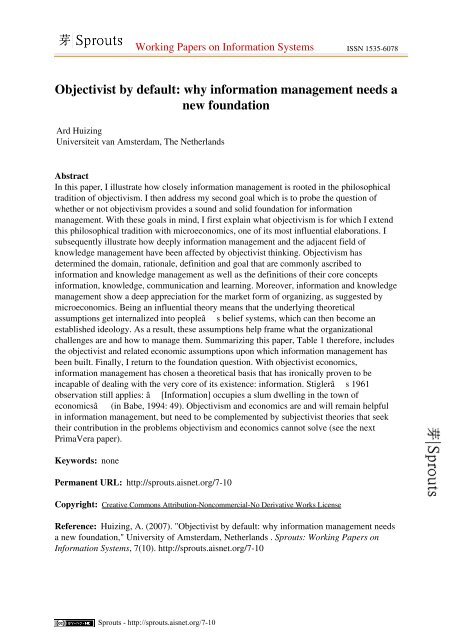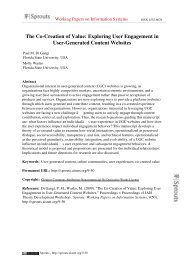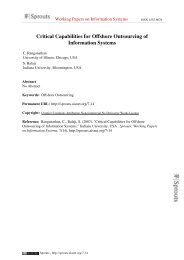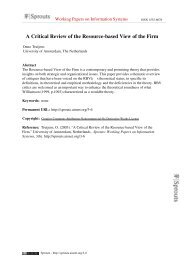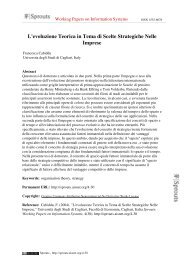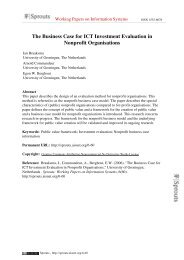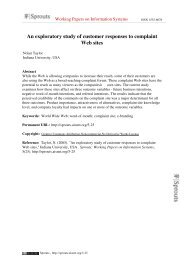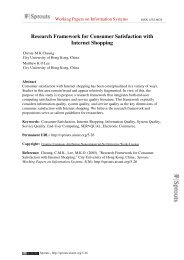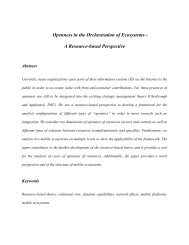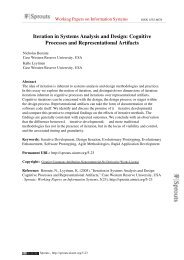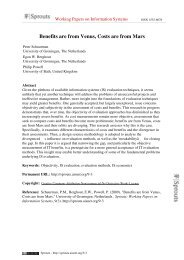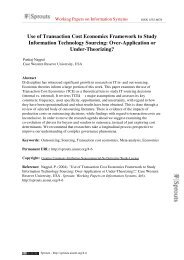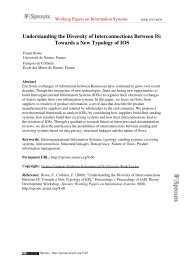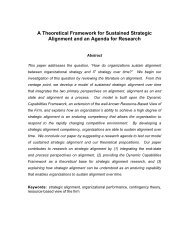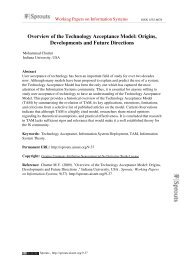Objectivist by default - Sprouts - Association for Information Systems
Objectivist by default - Sprouts - Association for Information Systems
Objectivist by default - Sprouts - Association for Information Systems
You also want an ePaper? Increase the reach of your titles
YUMPU automatically turns print PDFs into web optimized ePapers that Google loves.
Working Papers on In<strong>for</strong>mation <strong>Systems</strong> ISSN 1535-6078<br />
<strong>Objectivist</strong> <strong>by</strong> <strong>default</strong>: why in<strong>for</strong>mation management needs a<br />
new foundation<br />
Ard Huizing<br />
Universiteit van Amsterdam, The Netherlands<br />
Abstract<br />
In this paper, I illustrate how closely in<strong>for</strong>mation management is rooted in the philosophical<br />
tradition of objectivism. I then address my second goal which is to probe the question of<br />
whether or not objectivism provides a sound and solid foundation <strong>for</strong> in<strong>for</strong>mation<br />
management. With these goals in mind, I first explain what objectivism is <strong>for</strong> which I extend<br />
this philosophical tradition with microeconomics, one of its most influential elaborations. I<br />
subsequently illustrate how deeply in<strong>for</strong>mation management and the adjacent field of<br />
knowledge management have been affected <strong>by</strong> objectivist thinking. Objectivism has<br />
determined the domain, rationale, definition and goal that are commonly ascribed to<br />
in<strong>for</strong>mation and knowledge management as well as the definitions of their core concepts<br />
in<strong>for</strong>mation, knowledge, communication and learning. Moreover, in<strong>for</strong>mation and knowledge<br />
management show a deep appreciation <strong>for</strong> the market <strong>for</strong>m of organizing, as suggested <strong>by</strong><br />
microeconomics. Being an influential theory means that the underlying theoretical<br />
assumptions get internalized into peopleâs belief systems, which can then become an<br />
established ideology. As a result, these assumptions help frame what the organizational<br />
challenges are and how to manage them. Summarizing this paper, Table 1 there<strong>for</strong>e, includes<br />
the objectivist and related economic assumptions upon which in<strong>for</strong>mation management has<br />
been built. Finally, I return to the foundation question. With objectivist economics,<br />
in<strong>for</strong>mation management has chosen a theoretical basis that has ironically proven to be<br />
incapable of dealing with the very core of its existence: in<strong>for</strong>mation. Stiglerâs 1961<br />
observation still applies: â[In<strong>for</strong>mation] occupies a slum dwelling in the town of<br />
economicsâ (in Babe, 1994: 49). Objectivism and economics are and will remain helpful<br />
in in<strong>for</strong>mation management, but need to be complemented <strong>by</strong> subjectivist theories that seek<br />
their contribution in the problems objectivism and economics cannot solve (see the next<br />
PrimaVera paper).<br />
Keywords: none<br />
Permanent URL: http://sprouts.aisnet.org/7-10<br />
Copyright: Creative Commons Attribution-Noncommercial-No Derivative Works License<br />
Reference: Huizing, A. (2007). "<strong>Objectivist</strong> <strong>by</strong> <strong>default</strong>: why in<strong>for</strong>mation management needs<br />
a new foundation," University of Amsterdam, Netherlands . <strong>Sprouts</strong>: Working Papers on<br />
In<strong>for</strong>mation <strong>Systems</strong>, 7(10). http://sprouts.aisnet.org/7-10<br />
<strong>Sprouts</strong> - http://sprouts.aisnet.org/7-10
<strong>Objectivist</strong> <strong>by</strong> <strong>default</strong>: why in<strong>for</strong>mation management needs a new foundation<br />
<strong>Objectivist</strong> <strong>by</strong> <strong>default</strong>: why in<strong>for</strong>mation management needs a new<br />
foundation<br />
Ard Huizing<br />
University of Amsterdam Business School<br />
The Netherlands<br />
Abstract<br />
In this paper, I illustrate how closely in<strong>for</strong>mation management is rooted in the philosophical tradition of<br />
objectivism. I then address my second goal which is to probe the question of whether or not objectivism<br />
provides a sound and solid foundation <strong>for</strong> in<strong>for</strong>mation management. With these goals in mind, I first<br />
explain what objectivism is <strong>for</strong> which I extend this philosophical tradition with microeconomics, one of<br />
its most influential elaborations. I subsequently illustrate how deeply in<strong>for</strong>mation management and the<br />
adjacent field of knowledge management have been affected <strong>by</strong> objectivist thinking. Objectivism has<br />
determined the domain, rationale, definition and goal that are commonly ascribed to in<strong>for</strong>mation and<br />
knowledge management as well as the definitions of their core concepts in<strong>for</strong>mation, knowledge,<br />
communication and learning. Moreover, in<strong>for</strong>mation and knowledge management show a deep<br />
appreciation <strong>for</strong> the market <strong>for</strong>m of organizing, as suggested <strong>by</strong> microeconomics. Being an influential<br />
theory means that the underlying theoretical assumptions get internalized into people’s belief systems,<br />
which can then become an established ideology. As a result, these assumptions help frame what the<br />
organizational challenges are and how to manage them. Summarizing this paper, Table 1 there<strong>for</strong>e,<br />
includes the objectivist and related economic assumptions upon which in<strong>for</strong>mation management has been<br />
built. Finally, I return to the foundation question. With objectivist economics, in<strong>for</strong>mation management<br />
has chosen a theoretical basis that has ironically proven to be incapable of dealing with the very core of<br />
its existence: in<strong>for</strong>mation. Stigler’s 1961 observation still applies: “[In<strong>for</strong>mation] occupies a slum<br />
dwelling in the town of economics” (in Babe, 1994: 49). Objectivism and economics are and will remain<br />
helpful in in<strong>for</strong>mation management, but need to be complemented <strong>by</strong> subjectivist theories that seek their<br />
contribution in the problems objectivism and economics cannot solve (see the next PrimaVera paper).<br />
<strong>Sprouts</strong> - http://sprouts.aisnet.org/7-10<br />
2
<strong>Objectivist</strong> <strong>by</strong> <strong>default</strong>: why in<strong>for</strong>mation management needs a new foundation<br />
INDEX<br />
1. What Is Objectivism? .............................................................................................................................4<br />
2. The Transactional Edifice of Microeconomics.....................................................................................7<br />
3. The Logic behind Objectification ..........................................................................................................8<br />
4. Conceptual Implications: In<strong>for</strong>mation Management’s Domain, Rationale, Definition and Goal...9<br />
5. Organizational Implications: What the Market Metaphor Highlights and Hides..........................11<br />
6. Economics’ strongest and weakest quality .........................................................................................15<br />
7. The Future of Objectivism ...................................................................................................................15<br />
8. Discussion and Conclusions: A Sound Foundation?..........................................................................17<br />
References..................................................................................................................................................22<br />
<strong>Sprouts</strong> - http://sprouts.aisnet.org/7-10<br />
3
<strong>Objectivist</strong> <strong>by</strong> <strong>default</strong>: why in<strong>for</strong>mation management needs a new foundation<br />
1. What Is Objectivism?<br />
Objectivism is <strong>by</strong> far the dominant world view in Western culture. I use objectivism as an umbrella term<br />
<strong>for</strong> all of those schools of thought and theories that are based upon the idea that <strong>for</strong> knowledge<br />
development, we should view the world as consisting of distinct objects that can and should be separated<br />
from their originators and users. Building on a long tradition of rationalist and empiricist theory<br />
construction, this idea is deeply entrenched in sciences such as economics, computer science,<br />
mathematics and sociology as well as in business disciplines like accountancy and financial management.<br />
It also governs large parts of in<strong>for</strong>mation management and the adjacent fields of knowledge and learning,<br />
both in theory and in practice. In<strong>for</strong>mation management is objectivist <strong>by</strong> <strong>default</strong>.<br />
In a general sense, objectivism is associated with “scientific truth, rationality, precision, fairness,<br />
and impartiality” (Lakoff & Johnson, 1980: 189). <strong>Objectivist</strong>s claim that human behavior is determined<br />
<strong>by</strong> <strong>for</strong>ces in the external world. People, however, cannot control these external <strong>for</strong>ces and find them<br />
difficult to comprehend. They should there<strong>for</strong>e be supported with knowledge to help them master their<br />
environment, which would lead to successful per<strong>for</strong>mance. Consequently, <strong>for</strong> developing knowledge<br />
relevant to practice, we should be focused on the external aspects of how we understand our worlds.<br />
The world external to individual human beings is thought to be made up of distinct, real objects.<br />
These objects are supposed to have inherent properties, implying that objects are not affected <strong>by</strong> the way<br />
we think of them or how we use them. A rose is a rose is a rose, regardless of how someone perceives it,<br />
if at all. Objects live on their own, immune to our subjective thoughts, feelings and emotions. They have<br />
fixed meanings that can be known <strong>by</strong> investigating their inherent properties. Roses have thorns,<br />
distinctive smells and other fixed properties that together define our interactions with and understandings<br />
of this flower category. Once these properties are fully understood, true and lasting knowledge has been<br />
gained.<br />
Building theory upon the inherent properties of in<strong>for</strong>mation and knowledge is an approach<br />
favored in the relevant literatures (Shapiro & Varian, 1999 and Boisot, 1998, respectively). Commonly<br />
the reasoning is that traditional theories have been developed <strong>for</strong> the industrial age that aim to support<br />
organizations in managing physical goods. In<strong>for</strong>mation and knowledge, however, have properties<br />
characteristically deviating from those of physical goods. Typical examples of such idiosyncratic<br />
properties implicating management and organization are, <strong>for</strong> instance, that in<strong>for</strong>mation can easily be<br />
copied perfectly at minimal costs or that knowledge can appreciate with use. Understanding these<br />
inherent and objective properties and structuring them into a framework of abstracted cause and effect<br />
relationships create theory that guides organizations in the in<strong>for</strong>mation or knowledge society. The related<br />
implication <strong>for</strong> in<strong>for</strong>mation management is that its identity could be built upon such distinct expert<br />
knowledge. It is what could set in<strong>for</strong>mation management apart as a value adding business function.<br />
4<br />
<strong>Sprouts</strong> - http://sprouts.aisnet.org/7-10
<strong>Objectivist</strong> <strong>by</strong> <strong>default</strong>: why in<strong>for</strong>mation management needs a new foundation<br />
Hence, we can better understand our external environment <strong>by</strong> exploring and abstracting the<br />
inherent properties of the objects in it and using the knowledge thus gained to determine our relationships<br />
to the objects. In objectivism, knowledge consists of discrete and abstracted granules of understanding<br />
representing objective realities and learning is a step-<strong>by</strong>-step process directed towards the constant<br />
refinement of these factual representations. Clearly delineating objects’ inherent properties and<br />
understanding how these properties relate to each other is considered to be the gateway to knowledge and<br />
to mastery over the environment <strong>for</strong> those who have that knowledge.<br />
Moreover, since knowledge in objectivism is factual, objective and fixed, it is transferable to<br />
others <strong>by</strong> means of communication. Through communication, the fixed meanings of objects are<br />
transferred from an active sender to a passive receiver, a view on communication that is known as the<br />
conduit metaphor (Bryant, 2007). In this view, the main source of communication failure is human<br />
subjectivity. Communication failures might occur when the sender has used inaccurate language or when<br />
the receiver was unaware of the exact meaning of the language used and subsequently misinterpreted the<br />
message.<br />
In objectivism, subjectivity is also to be suspected <strong>for</strong> other reasons. Because successful<br />
per<strong>for</strong>mance in the external environment is fully dependent upon it, knowledge creation cannot be left to<br />
individual people, prone as they are to human error instigated <strong>by</strong> personal and cultural biases, prejudices<br />
and other subjective limitations. The only real knowledge is considered to be objective, rational<br />
knowledge, <strong>for</strong> which we need science’s drive towards precision and timeless truths. Science allows us to<br />
abstract experiential knowledge from practice in such a way that ultimately correct, general and definitive<br />
accounts of reality can be given that are objectively, universally and unconditionally true. People can be<br />
objective, but only if they use clear and precise language consisting of words with fixed meanings, which<br />
match the reality that is being described. Science provides us with such language. Moreover, scientific<br />
methodologies allow us to present the resulting models of rational behavior as prescriptive theories that<br />
tell us how to be successful in the external environment. This positivist view on science, methodology<br />
and knowledge is also prevalent in the in<strong>for</strong>mation and knowledge literatures.<br />
Finally, objectivity is preferred over subjectivity, because it helps to rise above personal<br />
judgments, illusions and errors and, in that way, advances fairness and impartiality in human<br />
relationships. A management development program with promotion criteria clear to all those involved is a<br />
typical example of such intentions.<br />
Table 1 includes the points just made about objectivism. It also summarizes the remainder of this<br />
chapter with the intention to depict the deeper structure of objectivism and objectivist in<strong>for</strong>mation<br />
management.<br />
<strong>Sprouts</strong> - http://sprouts.aisnet.org/7-10<br />
5
<strong>Objectivist</strong> <strong>by</strong> <strong>default</strong>: why in<strong>for</strong>mation management needs a new foundation<br />
Table 1 Pinpointing Objectivism<br />
Objectivism’s Transactional Edifice<br />
Definitions<br />
1 In<strong>for</strong>mation and knowledge are granules of understanding representing objective realities.<br />
2 Learning is a step-<strong>by</strong>-step process directed towards the constant refinement of objective<br />
representations.<br />
3 Communication is the transfer of granules of understanding from a sender to a receiver.<br />
In<strong>for</strong>mation (and knowledge) management<br />
1 The domain of in<strong>for</strong>mation (knowledge) management is the in<strong>for</strong>mation (knowledge) supply side,<br />
culminating in the moment of truth.<br />
2 The rationale of in<strong>for</strong>mation (knowledge) management is promoting unfettered in<strong>for</strong>mation<br />
(knowledge) exchange.<br />
3 The goal of in<strong>for</strong>mation (knowledge) management is getting the right in<strong>for</strong>mation (knowledge) in the<br />
right <strong>for</strong>m to the right person at the right time.<br />
4 In<strong>for</strong>mation (knowledge) management is the gathering, refining, storing, preserving and dissemination<br />
of in<strong>for</strong>mation (knowledge).<br />
Organizing principles<br />
1 Shape in<strong>for</strong>mation and knowledge exchange as a market and create effective mechanisms to fully<br />
exploit the market’s self-organizing capacity.<br />
2 Maximize participation, discourage erection of entry barriers, and promote competition among<br />
participants.<br />
3 Commoditize in<strong>for</strong>mation and knowledge to render economic power.<br />
Core assumptions in objectivism<br />
1 Human behavior is determined <strong>by</strong> <strong>for</strong>ces in the external world.<br />
2 People cannot control these external <strong>for</strong>ces and find them difficult to comprehend.<br />
3 People should there<strong>for</strong>e be provided with truthful knowledge to help them master their environment.<br />
4 Mastery over the environment leads to successful per<strong>for</strong>mance.<br />
5 For developing relevant knowledge, we should focus on these external aspects of understanding.<br />
6 Understanding is dependent on truth.<br />
7 The environment consists of distinct objects that exist independently of human cognition and use.<br />
8 People understand the environment when they have knowledge of these objects.<br />
9 Such knowledge is developed <strong>by</strong> studying objects’ inherent properties.<br />
6<br />
<strong>Sprouts</strong> - http://sprouts.aisnet.org/7-10
<strong>Objectivist</strong> <strong>by</strong> <strong>default</strong>: why in<strong>for</strong>mation management needs a new foundation<br />
10 These inherent properties can be objectively known through codification and abstraction.<br />
11 Objects’ inherent properties are fixed and objective; meanings are there<strong>for</strong>e also fixed and objective.<br />
12 The only real and truthful knowledge is disembodied, abstracted and objective.<br />
13 Only positivist science produces real, truthful knowledge and reliable, prescriptive theory.<br />
14 Objectivity promotes fairness and impartiality in social matters.<br />
Additional assumptions in microeconomics<br />
1 Successful per<strong>for</strong>mance is defined <strong>by</strong> its economic value.<br />
2 Efficient exchange maximizes economic value.<br />
3 Hence, efficient exchange at the moment of truth should be the focal point of attention.<br />
4 Transactions stand on their own, implying that context, time and people’s identities, values and beliefs<br />
are irrelevant <strong>for</strong> theory and practice.<br />
5 People are economically rational and maximize their personal welfare.<br />
6 Competition among large numbers of non-hierarchical participants enhances market efficiency.<br />
7 Maximizing economic value requires commoditization of in<strong>for</strong>mation and knowledge.<br />
8 Commoditization enables measurement of per<strong>for</strong>mance and management control.<br />
9 ICT is a neutral medium.<br />
2. The Transactional Edifice of Microeconomics<br />
As a philosophical tradition, objectivism directly affects our views on in<strong>for</strong>mation management, and also<br />
indirectly through more mature, paradigmatically advanced sciences from which well-developed ideas<br />
and theories are imported. In the relatively young field of in<strong>for</strong>mation management, many references are<br />
made to neoclassical microeconomics, which is a highly influential application of this philosophical<br />
tradition. Deconstructing these references can show us what objectivist in<strong>for</strong>mation management is and<br />
what it is not.<br />
The influence of neoclassical economics can be read from a number of metaphors pervasive in<br />
in<strong>for</strong>mation management: in<strong>for</strong>mation exchange, in<strong>for</strong>mation transfer, in<strong>for</strong>mation use and in<strong>for</strong>mation<br />
management itself, among others, while similar metaphors are also common in knowledge management.<br />
The core idea imitated is that we should take the transaction of objects as the focal point of attention in<br />
building relevant theory. A transaction or exchange is understood as “a voluntary agreement involving the<br />
offer of any sort of present, continuing, or future utility in exchange <strong>for</strong> utilities of any sort offered in<br />
return” (Weber in Woolsey Biggart and Delbridge, 2004: 31).<br />
In microeconomics, objects are scarce and should there<strong>for</strong>e be used as efficiently as possible,<br />
whether they are “dollars, a bowl of whipped cream, available time, or even a reputation <strong>for</strong> honesty and<br />
<strong>Sprouts</strong> - http://sprouts.aisnet.org/7-10<br />
7
<strong>Objectivist</strong> <strong>by</strong> <strong>default</strong>: why in<strong>for</strong>mation management needs a new foundation<br />
skill” (Stigler, 1988: 193). However, most objects can be used in many ways and <strong>for</strong> different purposes,<br />
and can render a plethora of products and services. That possibility presents us with a pivotal organization<br />
and management challenge: how can scarce and thus valuable objects be optimally distributed over the<br />
alternative ways in which they can be deployed?<br />
The straight<strong>for</strong>ward answer of neoclassical economics is: <strong>by</strong> using the market <strong>for</strong>m of<br />
organization. As expressed in the neoclassical model of the perfect market, transacting objects on markets<br />
is the best way of securing optimal distribution, meaning that objects find their most efficient and<br />
profitable use through exchange. The relationship established between efficient distribution of objects and<br />
market exchange and then to economic value realization epitomizes the transactional edifice of<br />
neoclassical economics.<br />
Despite a number of fundamental problems in economics’ transactional edifice, which I will<br />
address later in this chapter, the model of the perfect market remains remarkably yet understandably<br />
influential. In business literature and practice, the moment of transacting is insightfully called ‘the<br />
moment of truth’, implying that it is at this particular instance in time that organizations realize their<br />
economic value. All organizational ef<strong>for</strong>t, so to speak, is geared towards this value-realizing moment<br />
when products and services are transferred quid pro quo to customers and clients. It is through efficient<br />
exchange that organizations maximize their value added and, hence, their economic growth. Part of this<br />
larger picture is the exchange of in<strong>for</strong>mation and knowledge, which is gaining significance with the<br />
development of a post-industrial economy. In<strong>for</strong>mation and knowledge are increasingly being considered<br />
the principal strategic resources <strong>for</strong> organizations and societies, and the ability to create and apply them,<br />
the core competences <strong>for</strong> building and sustaining competitive advantage or economic rent. Hence the<br />
need to adequately theorize in<strong>for</strong>mation and knowledge.<br />
3. The Logic behind Objectification<br />
The prospect of value realization and economic growth through efficient exchange explains not only the<br />
generally strong appeal of transactional thinking to decision makers in both private and public sectors, but<br />
also the logic behind objectification, or codification, as it is called in the knowledge management<br />
literature.<br />
Firstly, objectification is needed because exchange entails the conveyance of property rights,<br />
which requires legal ownership of that which is being transferred, and legal ownership in turn requires<br />
clearly defined objects. As reflected in the adage, ‘possession is nine-tenths of the law’ (Boisot, 1998:<br />
87), the only route open <strong>for</strong> organizations to claim ownership of in<strong>for</strong>mation and knowledge in a<br />
meaningful way is to turn them into such distinct objects, disembodied from their producers and<br />
consumers.<br />
8<br />
<strong>Sprouts</strong> - http://sprouts.aisnet.org/7-10
<strong>Objectivist</strong> <strong>by</strong> <strong>default</strong>: why in<strong>for</strong>mation management needs a new foundation<br />
Secondly, the objectification and transactionalization of in<strong>for</strong>mation and knowledge is justified<br />
<strong>by</strong> the potential of capturing in<strong>for</strong>mational economies of scale. Once objectified into unaffiliated<br />
documents, files or software, in<strong>for</strong>mation and knowledge can be replicated and re-used endlessly at<br />
minimal additional costs. As a result of this inherent property, the average cost per in<strong>for</strong>mation or<br />
knowledge exchange will be lower <strong>for</strong> high-frequency transactions; that is, the value of in<strong>for</strong>mation and<br />
knowledge increases as more people use it. Moreover, we often talk about in<strong>for</strong>mation and knowledge<br />
sharing instead of exchange, indicating that in<strong>for</strong>mation and knowledge are retained upon transaction.<br />
Unlike physical objects, their consumption does not eliminate them. The economic consequence of these<br />
inherent properties is that in<strong>for</strong>mation and knowledge are more likely to be optimally distributed than<br />
physical goods, ideally becoming available to everybody who can put them to productive use. Knowledge<br />
management’s dictum ‘if we only knew what we know’ perfectly reflects this ideal of entirely efficient<br />
markets.<br />
Thirdly, viewing in<strong>for</strong>mation and knowledge as distinct and exchangeable objects gives us a clear<br />
sense of what it is that needs to be organized, managed and evaluated. Objects can be gathered, stored,<br />
refined and distributed, all activities that can be managed and quantitatively measured. Quantification is<br />
an absolute requirement <strong>for</strong> economic modeling and analysis. The consequence of this prevalent view is<br />
that the subjectivists’ perspective of in<strong>for</strong>mation and knowledge residing in human minds and<br />
relationships that cannot be disembodied into distinct objects is ignored in economics. What cannot be<br />
quantified is consistently assumed away.<br />
4. Conceptual Implications: In<strong>for</strong>mation Management’s Domain, Rationale, Definition and Goal<br />
The objectivist-economic considerations mentioned above have helped frame the domain, rationale,<br />
definition and goal commonly ascribed to in<strong>for</strong>mation management. Following economics creates a<br />
‘natural’ distinction between the ‘in<strong>for</strong>mation supply side’ and the ‘in<strong>for</strong>mation demand side’, mediated<br />
<strong>by</strong> the moment of truth. It also contributes to a distinct preference <strong>for</strong> the in<strong>for</strong>mation supply side, <strong>for</strong> a<br />
number of reasons.<br />
As described in the previous section, the business need to maximize economic value urges the<br />
objectification and transactionalization of in<strong>for</strong>mation and knowledge. The logic behind objectification<br />
furthermore drives attention towards exploiting what we have or know rather than towards exploring what<br />
we do not have or understand. In objectivist in<strong>for</strong>mation management, there<strong>for</strong>e, the focus is on resolving<br />
supply side issues, such as objectifying available in<strong>for</strong>mation and knowledge, storing the resulting<br />
in<strong>for</strong>mation and knowledge objects independently from subjectivity of producers and consumers, and<br />
improving their availability and accessibility to enhance in<strong>for</strong>mation and knowledge distribution.<br />
Generally, there is little concern <strong>for</strong> what people actually do with in<strong>for</strong>mation and <strong>for</strong> how creative and<br />
9<br />
<strong>Sprouts</strong> - http://sprouts.aisnet.org/7-10
<strong>Objectivist</strong> <strong>by</strong> <strong>default</strong>: why in<strong>for</strong>mation management needs a new foundation<br />
dynamic learning processes may result in innovation and the creation of new knowledge. The objectivist<br />
<strong>default</strong> is: in<strong>for</strong>mation use is not our business! In<strong>for</strong>mation management might help fix the objective<br />
meanings of relevant words <strong>by</strong> such means as thesauri, taxonomies and data committees, but beyond that,<br />
the in<strong>for</strong>mation demand side is viewed as the concern of others or is seen as relatively unproblematic.<br />
This perspective on in<strong>for</strong>mation management is rein<strong>for</strong>ced <strong>by</strong> the conduit metaphor of communication<br />
and <strong>by</strong> economists assuming prices to be the quantitative expressions of the utility buyers and sellers<br />
subjectively attach to products and services.<br />
Moreover, the introduction of in<strong>for</strong>mation and communication technology mediating human<br />
interaction has also been a contributing factor to in<strong>for</strong>mation management specializing on the supply side.<br />
In economics, ICT is seen as a neutral medium that transports in<strong>for</strong>mation objects from the supply to the<br />
demand side. It helps in objectifying practice, <strong>for</strong> instance <strong>by</strong> reducing the cost of in<strong>for</strong>mation replication<br />
and re-use, and in transactionalizing in<strong>for</strong>mation objects <strong>by</strong> paving electronic roads between in<strong>for</strong>mation<br />
suppliers and users. By its very nature, ICT aids in enhancing the availability and accessibility of<br />
in<strong>for</strong>mation and knowledge and contributes little towards making sense of the messages conveyed.<br />
Moreover, the complexity of technology as such and of applying it successfully into organizational<br />
contexts has contributed to a technology-driven approach to in<strong>for</strong>mation management. As a next logical<br />
step in the ever-increasing division of labor that is so important <strong>for</strong> economic growth, ICT has become its<br />
own domain of expertise.<br />
Consequently, economic reasoning stimulates in<strong>for</strong>mation management to choose the supply and<br />
exchange of in<strong>for</strong>mation as its domain of expertise and the promotion of this exchange <strong>by</strong> helping to<br />
remove any barrier that prevents in<strong>for</strong>mation from flowing as freely as possible as its rationale. In theory<br />
and practice, there<strong>for</strong>e, in<strong>for</strong>mation management is generally described in terms of acquiring, refining,<br />
storing, preserving and disseminating in<strong>for</strong>mational representations of practice and its goal is described as<br />
getting the right representations in the right <strong>for</strong>m to the right person at the right time (Gurbaxani and<br />
Whang, 1991). These attributes of in<strong>for</strong>mation management can be clearly recognized in ICT or IS-driven<br />
approaches to in<strong>for</strong>mation management. What happens with the in<strong>for</strong>mation after it has been<br />
disseminated is occasionally included in the definition of in<strong>for</strong>mation management (Wilson, 1997), but<br />
often this aspect is ignored or minimized. Acquiring, refining, storing and preserving in<strong>for</strong>mation are<br />
in<strong>for</strong>mation management processes which relate to the objectification of reality, and disseminating<br />
in<strong>for</strong>mation relates to market mechanisms optimizing the distribution of the resulting in<strong>for</strong>mation objects.<br />
The observations made regarding in<strong>for</strong>mation management in the previous paragraph also apply<br />
to knowledge management. Knowledge management is often defined in the same terms as in<strong>for</strong>mation<br />
management, and is attributed a similar domain of expertise, rationale and goal (Davenport & Prusak,<br />
1998). The same erosion of notions can be discerned in practice, when a bookstore is suddenly called a<br />
<strong>Sprouts</strong> - http://sprouts.aisnet.org/7-10<br />
10
<strong>Objectivist</strong> <strong>by</strong> <strong>default</strong>: why in<strong>for</strong>mation management needs a new foundation<br />
‘knowledge shop’ or a database with frequently asked questions an ‘interactive knowledge center’.<br />
Precisely because of this identical emphasis on the objectification and economic value of knowledge,<br />
knowledge management cannot be anything else than in<strong>for</strong>mation management and vice versa. How<br />
could a knowledge object be different from an in<strong>for</strong>mation object or, <strong>for</strong> that matter, a data object? In<br />
objectivism, ‘data’, ‘in<strong>for</strong>mation’ and ‘knowledge’ can and are used interchangeably.<br />
5. Organizational Implications: What the Market Metaphor Highlights and Hides<br />
Apart from the conceptual implications <strong>for</strong> in<strong>for</strong>mation management’s domain, rationale, definition and<br />
goal, building in<strong>for</strong>mation management’s identity upon economics’ transactional edifice has considerable<br />
implications <strong>for</strong> organization theory and management practice. Transactions need to be organized, one<br />
way or another. The objectivist view that in<strong>for</strong>mation and knowledge can be separated from its generators<br />
and users into transferable objects determines how transactions can be best organized, managed and<br />
evaluated.<br />
Neoclassical orthodoxy favors the market <strong>for</strong>m of social organization, which can be applied to<br />
organizations’ external transactions with, <strong>for</strong> instance, suppliers or customers as well as to their internal<br />
transactions. The assumptions upon which the neoclassical model of the perfect market rests reflect the<br />
organizing principles involved and, in that way, also those assumptions and principles that are hidden. I<br />
will apply these assumptions and principles to in<strong>for</strong>mation and knowledge management under three<br />
headings: 1) create effective market mechanisms, 2) maximize participation and 3) commoditize<br />
in<strong>for</strong>mation and knowledge.<br />
The promise of economics is: the more closely in<strong>for</strong>mation and knowledge management adhere<br />
to the neoclassical assumptions and the organizing principles implied, the more perfect the established<br />
in<strong>for</strong>mation and knowledge markets will be, and the more efficiently in<strong>for</strong>mation and knowledge will be<br />
distributed. This appealing promise, however, obscures other aspects of reality that have been effectively<br />
wished away in economics’ drive towards theoretical rigor. Once captured <strong>by</strong> economics’ attractiveness,<br />
these other aspects of reality run the risk of getting ignored or downplayed, in theory as well as in<br />
practice. It is precisely at this point that the theory of the perfect market can become a market ideology.<br />
As will be illustrated in the next chapter of this book, the very same aspects of reality hidden in<br />
objectivism and economics are the ones emphasized in subjectivism.<br />
Create Effective Market Mechanisms<br />
The marvel of markets (Hayek, 1945) is that they are self-organizing, once effective market mechanisms<br />
are in place. In theory, these market mechanisms ensure that every bit of in<strong>for</strong>mation or knowledge<br />
necessary <strong>for</strong> decision making will be available at the right moment, which in turn allows people to be<br />
11<br />
<strong>Sprouts</strong> - http://sprouts.aisnet.org/7-10
<strong>Objectivist</strong> <strong>by</strong> <strong>default</strong>: why in<strong>for</strong>mation management needs a new foundation<br />
seen as fully rational agents regardless of their computational and cognitive limitations. The assumptions<br />
in neoclassical orthodoxy have been designed in such a way that prices contain all in<strong>for</strong>mation and<br />
knowledge <strong>for</strong> transactions to take place efficiently. All that people need to know to efficiently transact is<br />
the price of the object at hand. The price is the market’s in<strong>for</strong>mation system; the ‘invisible hand’ will take<br />
care of the rest. The perfect in<strong>for</strong>mation and communication assumption furthermore entails that any<br />
relevant change on the market is instantly reflected in a price change, which is immediately<br />
communicated to and processed <strong>by</strong> all market parties.<br />
In the field of in<strong>for</strong>mation and knowledge, however, prices are often absent, which turns the<br />
intrinsic and extrinsic motivations of people to share their in<strong>for</strong>mation and knowledge with others into a<br />
core organization issue. If prices are unknown, why would anybody consider sharing in<strong>for</strong>mation or<br />
knowledge? Extending the neoclassical assumption that rational people always maximize their selfinterests<br />
and personal welfare, this issue can be solved <strong>by</strong> assuming that rational people will readily<br />
objectify and exchange their in<strong>for</strong>mation and knowledge through market mechanisms other than price if<br />
they expect to be proportionately rewarded with tangible or intangible returns such as pay, promotions<br />
and bonuses or reputation, respect and prestige. Google and the many social networking sites available<br />
such as LinkedIn exemplify how deeply the market metaphor can in<strong>for</strong>m the shaping of in<strong>for</strong>mation and<br />
knowledge exchange.<br />
The transactional edifice of neoclassical economics is built upon other assumptions as well.<br />
Economics’ methodological individualism (Babe, 1994) suggests that both people and transactions can be<br />
seen as anonymous and independent atoms, which add up to nothing more than the sum of their parts.<br />
People pursue their own individual goals, driven <strong>by</strong> self-interest, each to themselves. Their identities are<br />
unimportant and their relationships need not become personal, because each transaction stands on its own<br />
<strong>for</strong> which, if needed, alternative exchange partners are readily found in our competitive markets.<br />
Moreover, anonymous exchange relationships do not require values and beliefs to be shared. Exchange<br />
partners, so to speak, do not have to be friends <strong>for</strong> transactions to be successfully accomplished.<br />
The organizing messages implied in these neoclassical assumptions are that people’s selfinterested<br />
drive to maximize their individual welfare should be explicitly addressed when establishing an<br />
in<strong>for</strong>mation or knowledge market. Create effective market mechanisms, observe how self-organizing<br />
in<strong>for</strong>mation providers and users find each other, and adjust the mechanisms, if and when that seems<br />
appropriate. In<strong>for</strong>mation or knowledge management in this sense is manipulating people’s behavior <strong>by</strong><br />
carefully addressing their self-interests.<br />
Hence, neoclassical orthodoxy provides a static equilibrium model characterized <strong>by</strong> supply and<br />
demand <strong>for</strong>ces that ignores any influence of context, time and immaterial values such as imagination,<br />
creativity or trust on people, relationships and transactions. The focus is entirely on the objects being<br />
<strong>Sprouts</strong> - http://sprouts.aisnet.org/7-10<br />
12
<strong>Objectivist</strong> <strong>by</strong> <strong>default</strong>: why in<strong>for</strong>mation management needs a new foundation<br />
discretely transacted, here and now, which is the aspect of reality the market metaphor exposes and<br />
emphasizes. What it hides are the relationships between people engaged in exchange, their history and<br />
future, their affiliations with the objects exchanged, the interaction of which the exchange of objects is<br />
just a part, the context in which transactions take place and the dynamics of the organizational processes<br />
involved. Economics is a science of nouns, not of verbs. It deals with static objects rather than with<br />
dynamic subjects, with in<strong>for</strong>mation, not in-<strong>for</strong>ming; with knowledge, not with knowing or learning.<br />
Maximize Participation<br />
Another assumption of neoclassical economics is that <strong>for</strong> markets to be efficient, they should consist of<br />
large numbers of transacting actors, none of whom has sufficient economic or political power to exert<br />
influence over the other. Ideally, there are no entry barriers either, so that all who wish can actually join.<br />
Large numbers of providers and users are furthermore needed to promote competition among as many<br />
in<strong>for</strong>mation and knowledge sources as possible. The more people participate in competition, the more<br />
in<strong>for</strong>mation and knowledge are generated and used, the more efficient in<strong>for</strong>mation and knowledge will be<br />
distributed, and the higher the likelihood that they will be put to their most productive uses.<br />
The implications <strong>for</strong> management and organization are straight<strong>for</strong>ward: <strong>for</strong> in<strong>for</strong>mation or<br />
knowledge management actions taken or technologies implemented, we should maximize the availability,<br />
accessibility and use of in<strong>for</strong>mation and knowledge <strong>by</strong> attracting as many participants as possible and <strong>by</strong><br />
avoiding creation of any entry barriers.<br />
This is the economists’ way of presenting markets as non-hierarchical and powerless institutions,<br />
where everybody can and should find whatever one is looking <strong>for</strong>. Praising intranets or virtual<br />
community, <strong>for</strong> instance, <strong>for</strong> their capacity to cross vertical and horizontal organizational boundaries<br />
clearly hinges on this element of the market metaphor, as does the alleged social nature of wikis and other<br />
social software tools. Moreover, all these instruments express the belief that group consensus on the basis<br />
of free exchange discloses a more objective and thus more accurate analysis of reality than any individual<br />
ever could. ‘Crowds’ are assumed to be unconditionally wiser than any single expert could wish to hope<br />
<strong>for</strong>. What this supposed non-hierarchical ‘wisdom of crowds’ conceals is that all kinds of monopolies and<br />
power structures are at work in all in<strong>for</strong>mation and knowledge ecologies. It also hides the fact that the<br />
participation of more people or availability of more in<strong>for</strong>mation may not necessarily translate into higherquality<br />
decisions or superior knowledge creation (Choo 2007). More is not always better.<br />
<strong>Sprouts</strong> - http://sprouts.aisnet.org/7-10<br />
13
<strong>Objectivist</strong> <strong>by</strong> <strong>default</strong>: why in<strong>for</strong>mation management needs a new foundation<br />
Commoditize in<strong>for</strong>mation and knowledge<br />
Finally, neoclassical economics tells us that, sooner or later, everything of economic value will be<br />
commoditized. Commodities are standardized, homogeneous goods, meaning that each copy is physically<br />
identical to the other. Such standardization permits counting and measurement, which is needed to set<br />
equilibrium prices <strong>for</strong> the relevant commodities. It also allows quantitative evaluation of per<strong>for</strong>mance and<br />
value realized, which adds to economics’ theoretical and practical attractiveness. Commoditization<br />
furthermore entails that the identities of the exchange parties and their relationships can be considered<br />
irrelevant <strong>for</strong> economic analysis, because if goods are homogeneous, it does not matter who the buyer or<br />
seller is. Under these conditions, the price is the only factor remaining in deciding with whom to trade.<br />
Moreover, these conditions allow parties to transactions to be treated as mere producers or consumers,<br />
anonymous atoms who do not interact with each other in any other way than <strong>by</strong> exchanging standardized<br />
objects. Finally, commoditization enables organizations to be maximally streamlined, with optimized<br />
business processes supported <strong>by</strong> ICT enhancing organizational efficiency.<br />
Commoditization renders economic power, which also applies to in<strong>for</strong>mation and knowledge.<br />
Ceasing in<strong>for</strong>mational economies of scale is possible only to the extent that in<strong>for</strong>mation and knowledge<br />
are turned into standardized objects. Think <strong>for</strong> instance of best practices stored in a database or seeing<br />
in<strong>for</strong>mation and knowledge as re-usable intellectual capital (Stewart, 1998). <strong>Objectivist</strong>s focus on<br />
extracting in<strong>for</strong>mation and knowledge from people through standardization and centralization processes<br />
to trans<strong>for</strong>m them into disembodied, de-contextualized commodities. Such standardization and<br />
centralization turns in<strong>for</strong>mation and knowledge into economic values that can be hierarchically controlled<br />
‘from above’ and measured in quantitative terms. Commoditization enables that, <strong>for</strong> example, in<strong>for</strong>mation<br />
management’s contribution to organizations can be evaluated in terms of its storing and processing<br />
capacity. Interestingly, contributions to the in<strong>for</strong>mation supply side are easier to quantify than those to the<br />
demand side, which adds to in<strong>for</strong>mation management’s inclination to specialize on the supply side as its<br />
sole domain of expertise.<br />
Economics’ strong emphasis on value realization and measurement giving a clear sense of what<br />
and how to organize <strong>for</strong> the moment of truth makes it relatively easy to sell to management and other<br />
decision makers (Bonifacio et al., 2004). That clear-cut virtue, however, comes at a price. The market<br />
metaphor hides the inability of economics to talk about in<strong>for</strong>mational content instead of the ‘hardware’<br />
through which that in<strong>for</strong>mation is distributed (Babe, 1994). This inability is caused <strong>by</strong> the impossibility of<br />
quantifying the economic value of in<strong>for</strong>mational content, which obstructs economic modeling and is,<br />
thus, excluded from the economist’s mind. That is, it is true that in<strong>for</strong>mation is increasingly<br />
commoditized into tradable objects such as books, software, mp3-files, or screens full of bits. However,<br />
their price is based on the technology to store, distribute and transmit these objects rather than on the<br />
<strong>Sprouts</strong> - http://sprouts.aisnet.org/7-10<br />
14
<strong>Objectivist</strong> <strong>by</strong> <strong>default</strong>: why in<strong>for</strong>mation management needs a new foundation<br />
in<strong>for</strong>mational value <strong>for</strong> their users. Ceteris paribus, a book that results in a major breakthrough in one’s<br />
intellectual development has the same price as the one that was bought but never read. Moreover, the<br />
same book can be highly valuable <strong>for</strong> one reader, but worthless <strong>for</strong> another. Put differently, in<strong>for</strong>mation’s<br />
value is fully dependent upon the meanings people attach to that in<strong>for</strong>mation and to the contexts they live<br />
in. That makes in<strong>for</strong>mation subjective rather than objective and heterogeneous instead of homogeneous,<br />
implying that there is no fixed relationship between economic value and in<strong>for</strong>mational content. When a<br />
one-to-one relationship between value and in<strong>for</strong>mational content is missing, it is impossible to set<br />
equilibrium prices. And without equilibrium prices, the entire neoclassical edifice collapses.<br />
6. Economics’ strongest and weakest quality<br />
In summary, highlighting economic value to be successful in competitive environments is arguably both<br />
the strongest and the weakest quality of economics and the market metaphor. It determines their<br />
attractiveness <strong>for</strong> organizations and societies as well as their most fundamental shortcoming. The<br />
attractiveness of economics comes from its consistent view of the world resulting in non-conflictive<br />
expectations and clear ‘how to’ implications <strong>for</strong> organizational practice. Missing a measuring standard,<br />
however, the main shortcoming of economics is that the effects of in<strong>for</strong>mation upon people’s perceptions,<br />
values, cognitive schemas or relationships are beyond its reach. In<strong>for</strong>mational content defies valuation,<br />
quantification and commoditization, as opposed to the in<strong>for</strong>mation objects carrying this content. The easy<br />
response of in<strong>for</strong>mation management would be to concentrate on the in<strong>for</strong>mation or knowledge supply<br />
side where this shortcoming is least felt, and ignore the demand side. As noted previously, that is exactly<br />
what often happens in and with in<strong>for</strong>mation management, in theory and in practice. Framing it this way,<br />
however, robs in<strong>for</strong>mation management of half of its potential identity.<br />
7. The Future of Objectivism<br />
The objectivist-economic view on in<strong>for</strong>mation, knowledge and communication can be traced back to the<br />
times when modern bureaucracies - nation states and corporations - were erected. Faced with more<br />
complex entities to govern and control, the politicians, administrators and managers of the day<br />
increasingly needed ‘statistics’ (Capurro and Hjorland, 2003), abstracted in<strong>for</strong>mation visualized in the<br />
<strong>for</strong>m of objectified reports, graphs, charts and models. As a result, the pre-modern notion of in<strong>for</strong>mation<br />
as in-<strong>for</strong>mation giving <strong>for</strong>m or shape to the human mind was gradually being replaced <strong>by</strong> in<strong>for</strong>mation as<br />
‘structured data’ (Boland, 1987) representing intangible realities too large to be directly experienced <strong>by</strong><br />
people’s senses. In<strong>for</strong>mation became an objective object, separated from human experiences and minds.<br />
Arguably the most profound implication of bureaucratization is that decisions of ‘life and death’<br />
<strong>Sprouts</strong> - http://sprouts.aisnet.org/7-10<br />
15
<strong>Objectivist</strong> <strong>by</strong> <strong>default</strong>: why in<strong>for</strong>mation management needs a new foundation<br />
(Douglas, 1986) are made on the basis of such disembodied in<strong>for</strong>mation. Nowadays enabled <strong>by</strong> ICT, our<br />
lives are increasingly subjected to objectification – as civilians, patients, customers, employees and so on<br />
- on which basis institutional decisions are taken <strong>for</strong> us. In this sense, ICT helps to connect, but also to<br />
disconnect.<br />
In current times, the objectification of in<strong>for</strong>mation and knowledge is gaining even more<br />
significance, mainly due to marketization, globalization and digitization to which it is recursively related.<br />
Exemplary in this regard is the inclusion of all kinds of knowledge products into the framework of the<br />
World Trade Organization through the General Agreement on Trade in Services. Induced <strong>by</strong> the logic of<br />
objectification, the idea behind this legally binding agreement is that knowledge is a commodity like any<br />
other product, which should be traded freely around the world while protecting the intellectual property<br />
rights of their owners. Ideas and knowledge are increasingly seen as if they are tradable objects, the<br />
effects of which are spread globally <strong>by</strong> modern communication.<br />
Another consequence of the economic trans<strong>for</strong>mations mentioned is that human interaction and<br />
communication become more transaction-based. “The culture of the new capitalism is attuned to singular<br />
events, one-off transactions, interventions” (Sennett, 2007: 178). The growing importance of bonuses <strong>for</strong><br />
specific accomplishments in the remuneration policy <strong>for</strong> top managers perfectly reflects this trend. The<br />
same policy applies to their most important advisors such as merchant bankers assisting in mergers and<br />
takeovers and to lower echelons of managers. Consequently, the view that organizations are long term cooperations<br />
between capital, labor and management is increasingly being substituted <strong>by</strong> a short term<br />
perspective stressing shareholder value.<br />
Another example of the shift towards a more transaction-based culture is the emergence of<br />
‘network sociality’ (Wittel, 2001). Due to the new economic conditions, working practices are<br />
increasingly typified <strong>by</strong> a high degree of specialization, rapid knowledge development, short-term<br />
projects, relentless changes caused <strong>by</strong> sequences of mergers and acquisitions, and decreasing job security<br />
resulting from disappearing life-time employment. In such situations where flexibility is needed (Beck,<br />
1992), people organize themselves in ever-broader, ICT-mediated networks that are characterized <strong>by</strong><br />
fleeting <strong>for</strong>ms of cooperation, weak social ties and the exchange of ephemeral in<strong>for</strong>mation to keep abreast<br />
of new developments. Network sociality stands <strong>for</strong> the commoditization of social relationships that arises<br />
from viewing ‘the other’ pre-dominantly as a social capital tool to enhance one’s own personal market<br />
value.<br />
So, the future of objectivism looks bright. Despite its shortcomings, it remains helpful in<br />
explaining and guiding real-world phenomena. The many concerns of global economic developments<br />
expressed in academic literature, popular press and daily newspaper, however, put the future of<br />
objectivism in a controversial perspective. Objectivity can promote fairness and impartiality in human<br />
<strong>Sprouts</strong> - http://sprouts.aisnet.org/7-10<br />
16
<strong>Objectivist</strong> <strong>by</strong> <strong>default</strong>: why in<strong>for</strong>mation management needs a new foundation<br />
relationships, because it makes us less dependent on the whims of subjectivity. Choo (2007), <strong>for</strong> instance,<br />
illustrates how in<strong>for</strong>mation management can help reduce such subjectivity in organizations.<br />
<strong>Objectivist</strong> approaches, however, can also be unfair, inhuman and dangerous (Lakoff and<br />
Johnson, 1980). Core to the current economic trans<strong>for</strong>mations is that ever larger parts of our private and<br />
organizational lives get objectified, stored in databases, and managed as such. Think of search engines<br />
commoditizing our search profiles or of customer relationship management systems. <strong>Objectivist</strong> practices<br />
can become unfair, inhuman and dangerous when such objectifications are taken as objective, nonnegotiable<br />
truths rather than what they truly are – incomplete and sometimes inaccurate representations of<br />
reality. Objectivism is focused on the external world in order to better understand how to operate<br />
successfully in the environment, an aspiration also commendable <strong>for</strong> in<strong>for</strong>mation management.<br />
Emphasizing impersonal relations of cause and effect, however, this philosophical tradition neglects the<br />
internal aspects of how people understand and subsequently shape their lives. In that sense, objectivism<br />
and in<strong>for</strong>mation management that is solely based upon this world view can result in losing touch with<br />
reality.<br />
8. Discussion and Conclusions: A Sound Foundation?<br />
So far I have illustrated how deeply in<strong>for</strong>mation management has been influenced <strong>by</strong> objectivism and<br />
economics, in theory and practice. Both will keep on exerting their influence, also because university<br />
curricula throughout the world sustain the objectivist images of in<strong>for</strong>mation and knowledge. Nevertheless,<br />
the question begs to be posed: does objectivism provide a sound and solid basis <strong>for</strong> in<strong>for</strong>mation<br />
management? The answer to this question depends upon which of the four economic images of<br />
in<strong>for</strong>mation and knowledge we are observing: 1) as free goods, 2) as other tangible, physical goods, 3) as<br />
idiosyncratic products and 4) as idiosyncratic resources or assets.<br />
In<strong>for</strong>mation and knowledge as free goods and as tangible products<br />
In neoclassical economics, in<strong>for</strong>mation and knowledge are viewed as free goods or as any other tangible<br />
product. The model of the perfect market has been constructed <strong>for</strong> the industrial age with the primary<br />
intention to theorize the transaction of tangible, physical products. There was no need to model<br />
in<strong>for</strong>mation and knowledge as objects of exchange in their own right, simply because in<strong>for</strong>mation<br />
products as we know them today hardly existed. Instead, economists saw in<strong>for</strong>mation and knowledge as<br />
means merely supportive of the exchange of physical goods. Being ‘only’ supportive of exchange,<br />
in<strong>for</strong>mation and knowledge could be assumed to be free goods, which, miraculously given, are<br />
unconstrained and non-problematic resources that can be justifiably excluded from economic analysis.<br />
Treating in<strong>for</strong>mation and knowledge alternatively as any other physical product served the same purpose.<br />
17<br />
<strong>Sprouts</strong> - http://sprouts.aisnet.org/7-10
<strong>Objectivist</strong> <strong>by</strong> <strong>default</strong>: why in<strong>for</strong>mation management needs a new foundation<br />
By denying in<strong>for</strong>mation and knowledge a distinctive character and role in economic processes, the price<br />
could be assumed to contain all the in<strong>for</strong>mation economic agents need to know to efficiently coordinate<br />
their transactions. In this way, in<strong>for</strong>mation and knowledge could be discarded without the model of the<br />
perfect market losing any of its explanatory power.<br />
These two neoclassical views on in<strong>for</strong>mation and knowledge lead to a paradoxical situation <strong>for</strong><br />
in<strong>for</strong>mation management - <strong>by</strong> having itself influenced so much <strong>by</strong> neoclassical economics, its identity is<br />
based upon a well-established theory that either denies its economic contribution or sees in<strong>for</strong>mation<br />
management as ‘business as usual’ not requiring any special attention. When in<strong>for</strong>mation and knowledge<br />
are perceived as free goods, the harsh verdict is that in<strong>for</strong>mation management cannot add any economic<br />
value. Free goods are economically insignificant. And when in<strong>for</strong>mation and knowledge are regarded as<br />
equal to physical products, organizations can do without a specialized in<strong>for</strong>mation management function.<br />
In both cases, the economic value of in<strong>for</strong>mation, ICT and in<strong>for</strong>mation management is hard to<br />
substantiate and verify, which could explain why so many organizations pursue the trend of outsourcing.<br />
Furthermore, should one be tempted to do so, the view on in<strong>for</strong>mation-as-free-good cannot be easily put<br />
aside as irrelevant <strong>for</strong> in<strong>for</strong>mation management. As many organizations experience, when present on the<br />
internet <strong>for</strong> instance, in<strong>for</strong>mation seekers are often not prepared to pay <strong>for</strong> their in<strong>for</strong>mation or<br />
in<strong>for</strong>mation services. In<strong>for</strong>mation-as-free-good explains the sometimes frantic search <strong>for</strong> alternative<br />
business models.<br />
These economic judgments of in<strong>for</strong>mation management can be contradicted <strong>by</strong> questioning their<br />
underlying assumptions. If all in<strong>for</strong>mation needed <strong>for</strong> decision making would be included in the price,<br />
nobody would be willing to invest in the gathering, production and communication of in<strong>for</strong>mation. A<br />
simple observation in the real world, however, is that people, organizations and societies do spend time,<br />
energy and money on these in<strong>for</strong>mational activities. Moreover, other than in the industrial age, many<br />
digital in<strong>for</strong>mation products such as mp3-files, <strong>for</strong> example, exist that are sold on markets. Finally,<br />
in<strong>for</strong>mation and knowledge are increasingly seen as the main sources of wealth creation and competitive<br />
edge <strong>for</strong> individuals, organizations and societies.<br />
Consequently, economists have created two new images of in<strong>for</strong>mation and knowledge that better<br />
resemble the real world: in<strong>for</strong>mation and knowledge as idiosyncratic products and as idiosyncratic<br />
resources or assets.<br />
In<strong>for</strong>mation and knowledge as idiosyncratic products and idiosyncratic resources or assets<br />
Both views of in<strong>for</strong>mation and knowledge entail focusing intellectually on the inherent and idiosyncratic<br />
properties of in<strong>for</strong>mation and knowledge that make them behave differently in an economic sense. Deep<br />
<strong>Sprouts</strong> - http://sprouts.aisnet.org/7-10<br />
18
<strong>Objectivist</strong> <strong>by</strong> <strong>default</strong>: why in<strong>for</strong>mation management needs a new foundation<br />
expert knowledge of those inherent properties and their implications <strong>for</strong> practice could provide a sound<br />
basis <strong>for</strong> in<strong>for</strong>mation management’s identity.<br />
However, these relatively new views on in<strong>for</strong>mation and knowledge also present in<strong>for</strong>mation<br />
management with idiosyncratic problems. As to the view of in<strong>for</strong>mation-as-idiosyncratic-product, socalled<br />
‘in<strong>for</strong>mation economists’ (Shapiro and Varian, 1999) have not succeeded yet in quantifying the<br />
in<strong>for</strong>mational content of these products. Instead, pricing such products is based upon the technology to<br />
store, distribute and convey in<strong>for</strong>mation objects. A more appropriate name <strong>for</strong> this branch of economics<br />
would there<strong>for</strong>e be ‘in<strong>for</strong>mation technology economics’. Nevertheless, in<strong>for</strong>mation economics deserves to<br />
be included in in<strong>for</strong>mation management’s curriculum. It deals with a part of the digital world that is not<br />
captured <strong>by</strong> other academic disciplines.<br />
In the last economic view, in<strong>for</strong>mation and knowledge are seen as idiosyncratic resources or<br />
assets capable of generating wealth in their own right. Building upon, among others, the knowledge-based<br />
view of the firm (Boisot, 1998), the practical implications of the economic differences with physical<br />
assets are considered to be so profound that knowledge-intensive organizations need a new theoretical<br />
perspective. This assertion is confirmed <strong>by</strong> Maes (2007) who states that the core of in<strong>for</strong>mation<br />
management is shifting from in<strong>for</strong>mation systems and technology to the management of in<strong>for</strong>mation as a<br />
business resource. With in<strong>for</strong>mation and knowledge as the heart of business, the potential value added of<br />
in<strong>for</strong>mation management would become instantly clear.<br />
Nonetheless, the resource view on in<strong>for</strong>mation and knowledge is not without its own intellectual<br />
challenges. Calling in<strong>for</strong>mation and knowledge a resource or asset symbolically trans<strong>for</strong>ms these entities<br />
into objects, which biases our understandings of what in<strong>for</strong>mation and knowledge are and what we can do<br />
with them. Due to limited space, I cannot address other recent developments in economics, such as<br />
defining in<strong>for</strong>mation as uncertainty reduction, but that does not change the bottom line: economic<br />
reasoning is always imbued <strong>by</strong> the logic of objectification. As a result of this engraved drive to objectify,<br />
three core problems arise that relate to objectivism in general and, thus, to all four economic views on<br />
in<strong>for</strong>mation and knowledge.<br />
Three core problems<br />
The first core problem of objectivist economics is that dynamic processes are beyond the analytical reach<br />
of economics because they do not demand an exclusive focus on the exchange of static objects and they<br />
are not required to con<strong>for</strong>m to rigorous quantification requirements. To fit economics’ modeling<br />
capabilities, in<strong>for</strong>mation and knowledge ‘simply’ have to be reduced to that which can be codified and<br />
commoditized, complex human communication and interaction to discrete, one-off transactions, and<br />
learning to the passive consumption of factual representations. As a result, economics is helpful in<br />
<strong>Sprouts</strong> - http://sprouts.aisnet.org/7-10<br />
19
<strong>Objectivist</strong> <strong>by</strong> <strong>default</strong>: why in<strong>for</strong>mation management needs a new foundation<br />
clarifying that knowledge needs to be codified in tradable objects to extract and protect its economic<br />
value. It is, however, not helpful in gaining understanding of how people and organizations use and create<br />
in<strong>for</strong>mation and knowledge to shape their everyday life (Kakihara and Sørensen, 2002). Moreover,<br />
economics contributes to an artificial and confusing divide between in<strong>for</strong>mation supply and demand,<br />
stressing the first and largely ignoring the latter. Could this divide help explain that so many of us seem to<br />
believe that once in<strong>for</strong>mation has been delivered, it has also been ‘consumed’?<br />
Secondly, the emphasis in objectivism on discovering universal truths precludes context as a<br />
factor important to economics. Once again, in<strong>for</strong>mation poses insurmountable problems. Economic, not<br />
sociological, reasoning is as follows (Babe, 1994). When all suppliers charge the same price <strong>for</strong> the same<br />
good, the price is less in<strong>for</strong>mative <strong>for</strong> buyers than when it is sold at different prices. Hence, the value or<br />
meaning of in<strong>for</strong>mation, here the price, is context-dependent, much to the dismay of mainstream<br />
economists.<br />
Thirdly, truth and meanings are relative not only to context, but also to people’s mental<br />
frameworks or conceptual systems of how the world works. For both reasons, human beings cannot act<br />
differently than to impute their own meanings to in<strong>for</strong>mation. Hence, it is also possible that different<br />
people attach divergent interpretations to the same in<strong>for</strong>mation or that the same person interprets the<br />
same in<strong>for</strong>mation differently when faced with a different context. Economists cannot deal with such<br />
divergent sense making behavior. In<strong>for</strong>mation is supposed to help bring supply and demand together in an<br />
equilibrium price. For in<strong>for</strong>mation to have such equilibrating effects, however, all economic agents have<br />
to interpret it in the same direction (Boisot, 1998). Without this crucial assumption, in<strong>for</strong>mation would<br />
become an unpredictable phenomenon that cannot be analyzed or even observed a priori, which would<br />
cause the neoclassical edifice to fall apart. With this assumption, however, economists exclude a major<br />
source of learning and innovation. Once again, relevance is sacrificed <strong>for</strong> rigor.<br />
Conclusions<br />
In summary, no matter how much progress has been made ever since, Stigler’s 1961 remark still applies:<br />
“[In<strong>for</strong>mation] occupies a slum dwelling in the town of economics” (in Babe, 1994: 49). One conclusion<br />
is that the so-called in<strong>for</strong>mation or knowledge economy still misses one of its critical cornerstones - an<br />
economic theory of in<strong>for</strong>mation, knowledge and learning. Another – ironic – conclusion is that<br />
in<strong>for</strong>mation management with its choice <strong>for</strong> objectivism and microeconomics as its foundation has<br />
precisely selected a philosophy and theory that are incapable of justifying and grounding the very heart of<br />
its existence: in<strong>for</strong>mation. This conclusion also means that an integrative approach to in<strong>for</strong>mation<br />
management should entail more or something different than ‘the management of in<strong>for</strong>mation as a<br />
<strong>Sprouts</strong> - http://sprouts.aisnet.org/7-10<br />
20
<strong>Objectivist</strong> <strong>by</strong> <strong>default</strong>: why in<strong>for</strong>mation management needs a new foundation<br />
business resource’ (Maes, 2007). In the next PrimaVera working paper, I will look <strong>for</strong> inspiration in<br />
subjectivist theories that seek their contribution in the problems objectivism and economics cannot solve.<br />
<strong>Sprouts</strong> - http://sprouts.aisnet.org/7-10<br />
21
<strong>Objectivist</strong> <strong>by</strong> <strong>default</strong>: why in<strong>for</strong>mation management needs a new foundation<br />
References<br />
Babe, R.E. (1994), The Place of In<strong>for</strong>mation in Economics. In: Babe, R.E.(ed.), In<strong>for</strong>mation and<br />
Communication in Economics, Boston: Kluwer Academic Publishers: 41-67.<br />
Beck, U. (1992) Risk Society. London: Sage Publications.<br />
Boisot, M.H. (1998), Knowledge Assets: Securing Competitive Advantage in the In<strong>for</strong>mation Economy,<br />
Ox<strong>for</strong>d: Ox<strong>for</strong>d University Press.<br />
Boland, R.J. (1987), The In-<strong>for</strong>mation of In<strong>for</strong>mation <strong>Systems</strong>. In: R.J. Boland and R.A.<br />
Hirschheim (eds.), Critical Issues in In<strong>for</strong>mation <strong>Systems</strong> Research, John Wiley & Sons, pp. 363-379.<br />
Bryant, A. (2007), In<strong>for</strong>mation and the CIO, in: Huizing, A. and Vries, E.J. de (2007), In<strong>for</strong>mation<br />
Management: Setting the Scene, Ox<strong>for</strong>d: Elsevier, <strong>for</strong>thcoming.<br />
Bonifacio, M., Camussone, P. and Zini, C. (2004), Managing the KM Trade-Off: Knowledge<br />
Centralization versus Distribution, Journal of Universal Computer Science, Vol. 10, No. 3: 162-175.<br />
Capurro, R. and Hjorland, B. (2003) The concept of in<strong>for</strong>mation. Annual Review of In<strong>for</strong>mation Science<br />
and Technology, in: B. Cronin (ed.), Vol. 37, Chapter 8: 343-411.<br />
Choo, C.W. (2007), Social Use of In<strong>for</strong>mation in Organizational Groups, in: Huizing, A. and Vries, E.J.<br />
de (2007), In<strong>for</strong>mation Management: Setting the Scene, Ox<strong>for</strong>d: Elsevier, <strong>for</strong>thcoming.<br />
Davenport, T.H. and L. Prusak (1998), Working Knowledge, Boston: Harvard Business School Press.<br />
Douglas, M. (1986), How Institutions Think, London: Routledge.<br />
Gurbaxani, V. and Whang, S. (1991), The Impact of In<strong>for</strong>mation <strong>Systems</strong> on Organizations and Markets,<br />
Communications of the ACM, Vol. 34, No. 1: 59-73.<br />
Hayek, F.A. (1945), The Use of Knowledge in Society, American Economic Review, Vol. 35, No. 4: 519-<br />
530.<br />
Kakihara, M. and Sørensen, C. (2002). Exploring Knowledge Emergence: From Chaos to Organizational<br />
Knowledge, Journal of Global In<strong>for</strong>mation Technology Management, Vol. 5, No. 33: 48-66.<br />
Lakoff, G, and Johnson, M. (1980), Metaphors We Live By, Chicago: The University of Chicago Press.<br />
Maes, R.. (2007), An Integrative Perspective on In<strong>for</strong>mation Management, in: Huizing, A. and Vries, E.J.<br />
de (2007), In<strong>for</strong>mation Management: Setting the Scene, Ox<strong>for</strong>d: Elsevier, <strong>for</strong>thcoming. .<br />
Sennett, R. (2007), The Culture of the New Capitalism, New Haven: Yale University Press.<br />
Shapiro, C. and H.R. Varian (1999), In<strong>for</strong>mation Rules – A Strategic Guide to the Network Economy,<br />
Boston: Harvard Business School Press.<br />
Stewart, T.A. (1998), Intellectual Capital: The New Wealth of Organizations, Currency.<br />
Stigler, (1988), Memoirs of an Unregulated Economist, New York: Basic Books.<br />
<strong>Sprouts</strong> - http://sprouts.aisnet.org/7-10<br />
22
<strong>Objectivist</strong> <strong>by</strong> <strong>default</strong>: why in<strong>for</strong>mation management needs a new foundation<br />
Wilson, T.D. (1997). In<strong>for</strong>mation management: International Encyclopedia of In<strong>for</strong>mation and Library<br />
Science. London: Routledge.<br />
Wittel, A. (2001), Toward a Network Sociality, Theory, Culture & Society, Vol. 18: 51-76.<br />
Woolsey Biggart, N. and Delbridge, R. (2004) <strong>Systems</strong> of exchange, The Academy of Management<br />
Review, Vol. 29, No. 1: 28-49.<br />
<strong>Sprouts</strong> - http://sprouts.aisnet.org/7-10<br />
23
<strong>Objectivist</strong> <strong>by</strong> <strong>default</strong>: why in<strong>for</strong>mation management needs a new foundation<br />
24<br />
<strong>Sprouts</strong> - http://sprouts.aisnet.org/7-10
Editors:<br />
Michel Avital, University of Amsterdam<br />
Kevin Crowston, Syracuse University<br />
Working Papers on In<strong>for</strong>mation <strong>Systems</strong> | ISSN 1535-6078<br />
Advisory Board:<br />
Kalle Lyytinen, Case Western Reserve University<br />
Roger Clarke, Australian National University<br />
Sue Conger, University of Dallas<br />
Marco De Marco, Universita’ Cattolica di Milano<br />
Guy Fitzgerald, Brunel University<br />
Rudy Hirschheim, Louisiana State University<br />
Blake Ives, University of Houston<br />
Sirkka Jarvenpaa, University of Texas at Austin<br />
John King, University of Michigan<br />
Rik Maes, University of Amsterdam<br />
Dan Robey, Georgia State University<br />
Frantz Rowe, University of Nantes<br />
Detmar Straub, Georgia State University<br />
Richard T. Watson, University of Georgia<br />
Ron Weber, Monash University<br />
Kwok Kee Wei, City University of Hong Kong<br />
Sponsors:<br />
<strong>Association</strong> <strong>for</strong> In<strong>for</strong>mation <strong>Systems</strong> (AIS)<br />
AIM<br />
itAIS<br />
Addis Ababa University, Ethiopia<br />
American University, USA<br />
Case Western Reserve University, USA<br />
City University of Hong Kong, China<br />
Copenhagen Business School, Denmark<br />
Hanken School of Economics, Finland<br />
Helsinki School of Economics, Finland<br />
Indiana University, USA<br />
Katholieke Universiteit Leuven, Belgium<br />
Lancaster University, UK<br />
Leeds Metropolitan University, UK<br />
National University of Ireland Galway, Ireland<br />
New York University, USA<br />
Pennsylvania State University, USA<br />
Pepperdine University, USA<br />
Syracuse University, USA<br />
University of Amsterdam, Netherlands<br />
University of Dallas, USA<br />
University of Georgia, USA<br />
University of Groningen, Netherlands<br />
University of Limerick, Ireland<br />
University of Oslo, Norway<br />
University of San Francisco, USA<br />
University of Washington, USA<br />
Victoria University of Wellington, New Zealand<br />
Viktoria Institute, Sweden<br />
Editorial Board:<br />
Margunn Aanestad, University of Oslo<br />
Steven Alter, University of San Francisco<br />
Egon Berghout, University of Groningen<br />
Bo-Christer Bjork, Hanken School of Economics<br />
Tony Bryant, Leeds Metropolitan University<br />
Erran Carmel, American University<br />
Kieran Conboy, National U. of Ireland Galway<br />
Jan Damsgaard, Copenhagen Business School<br />
Robert Davison, City University of Hong Kong<br />
Guido Dedene, Katholieke Universiteit Leuven<br />
Alan Dennis, Indiana University<br />
Brian Fitzgerald, University of Limerick<br />
Ole Hanseth, University of Oslo<br />
Ola Henfridsson, Viktoria Institute<br />
Sid Huff, Victoria University of Wellington<br />
Ard Huizing, University of Amsterdam<br />
Lucas Introna, Lancaster University<br />
Panos Ipeirotis, New York University<br />
Robert Mason, University of Washington<br />
John Mooney, Pepperdine University<br />
Steve Sawyer, Pennsylvania State University<br />
Virpi Tuunainen, Helsinki School of Economics<br />
Francesco Virili, Universita' degli Studi di Cassino<br />
Managing Editor:<br />
Bas Smit, University of Amsterdam<br />
Office:<br />
<strong>Sprouts</strong><br />
University of Amsterdam<br />
Roetersstraat 11, Room E 2.74<br />
1018 WB Amsterdam, Netherlands<br />
Email: admin@sprouts.aisnet.org


